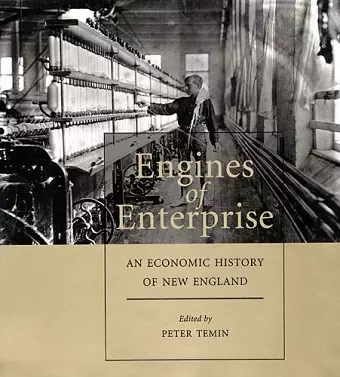Engines of Enterprise
An Economic History of New England
Format:Paperback
Publisher:Harvard University Press
Published:29th Nov '02
Currently unavailable, and unfortunately no date known when it will be back

The focus on New England's economic growth over a long period makes this a unique work,and it works well as general history as well as economic history. While it will appeal most to those living in or interested in New England, the thrust on economic and social change will also interest others. Each of the essays is an original, drawing upon the most recent scholarship, and the overall contribution to the history of economic change in a major region will fit into ongoing debates about the causes and consequences of economic growth. -- Stanley L. Engerman, University of Rochester
From an inauspicious beginning New England went on to lead the U.S. in its transformation from an agrarian to an industrial economy. In the mid-20th century, New England reinvented itself as a leader in the complex economy of the information society. The dramatic story is told in a sequence of essays written by preeminent historians and economists.
New England's economy has a history as dramatic as any in the world. From an inauspicious beginning--as immigration ground to a halt in the eighteenth century--New England went on to lead the United States in its transformation from an agrarian to an industrial economy. And when the rest of the country caught up in the mid-twentieth century, New England reinvented itself as a leader in the complex economy of the information society.
Engines of Enterprise tells this dramatic story in a sequence of narrative essays written by preeminent historians and economists. These essays chart the changing fortunes of entrepreneurs and venturers, businessmen and inventors, and common folk toiling in fields, in factories, and in air-conditioned offices. The authors describe how, short of staple crops, colonial New Englanders turned to the sea and built an empire; and how the region became the earliest home of the textile industry as commercial fortunes underwrote new industries in the nineteenth century. They show us the region as it grew ahead of the rest of the country and as the rest of the United States caught up. And they trace the transformation of New England's products and exports from cotton textiles and machine tools to such intangible goods as education and software. Concluding short essays also put forward surprising but persuasive arguments--for instance, that slavery, while not prominent in colonial New England, was a critical part of the economy; and that the federal government played a crucial role in the development of the region's industrial skills.
New England has been subjected to more economic history studies than any other region, except the South, but coherent explanations of long-term change remain scarce… This book helps rectify these gaps in our knowledge and points to future research. The essays, a result of a conference at the Federal Reserve Bank of Boston, intend to provide a survey of New England’s economic history and an intellectual rationale for the Bank’s creation of a New England economic history museum… [The contributors] succeed in stimulating fascinating questions for future research. -- David R. Meyer * H-Net Reviews *
Eight papers, resulting from a conference held by the Federal Reserve Bank of Boston in October 1998, explore the economic history of New England and provide a foundation for a New England economic history museum. * Journal of Economic Literature *
Their conclusions range from confidence that the region marches along the path of economic success because of its inherent characteristics, to the suggestion that there may be some serendipity at work as well… The reader seeking a detailed presentation of the economic activities of each era will be delighted by the specific and in-depth research offered by most of the authors. -- Carol C. McDonough * Eastern Economic Journal *
The focus on New England’s economic growth over a long period makes this a unique work, and it works well as general history as well as economic history. While it will appeal most to those living in or interested in New England, the thrust on economic and social change will also interest others. Each of the essays is an original, drawing upon the most recent scholarship, and the overall contribution to the history of economic change in a major region will fit into ongoing debates about the causes and consequences of economic growth. -- Stanley L. Engerman, University of Rochester
- Nominated for Hagley Prize in Business History 2001
- Nominated for Sally Hacker Prize 2001
- Nominated for Dexter Prize 2001
- Nominated for Hagley Prize in Business History 2002
ISBN: 9780674009844
Dimensions: unknown
Weight: 544g
336 pages